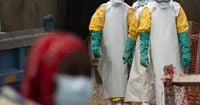In a troubling development for global health, the Democratic Republic of Congo (DRC) is once again grappling with an Ebola outbreak, the sixteenth such crisis since the virus was first identified there in 1976. Health officials confirmed the outbreak on September 4, 2025, following the death of a 34-year-old pregnant woman in the locality of Boulapé, within Mweka territory in southern Kasai province. Her passing, which occurred only hours after hospital admission due to symptoms of hemorrhagic fever, has become the tragic emblem of a situation that experts warn could quickly spiral.
According to the DRC Health Ministry, this latest outbreak has already claimed at least 15 lives among 28 suspected cases, including four health workers. The fatality rate, at a grim 53.6%, highlights the severity of the situation. The World Health Organization (WHO) has sounded the alarm, stating, "Case numbers are likely to increase as the transmission is ongoing." The organization emphasized that response teams are racing against time to locate and care for those potentially infected, aiming to halt the virus's relentless advance.
The strain at the heart of this outbreak is the notorious Zaire Ebola virus, the most virulent form known to science. The National Institute for Biomedical Research in Kinshasa confirmed its presence after analyzing samples from the initial cases. This Zaire strain has a history of devastation, most notably during the West African epidemic of 2014, which killed over 11,000 people, as reported by BBC.
The Ebola virus is infamous for its swift and deadly progression. Symptoms typically begin with sudden fever, profound weakness, muscle pain, and sore throat. As the disease advances, patients may experience vomiting, diarrhea, and—in some cases—both internal and external bleeding, a condition known as hemorrhaging. The incubation period is variable, ranging from two days to three weeks, making containment especially challenging. According to BBC, patients often succumb to dehydration and multiple organ failure, underscoring the lethal nature of the disease.
Transmission of Ebola is alarmingly efficient. The virus initially jumps from wild animals—primarily fruit bats, but also chimpanzees and forest antelope—to humans. Once established in human hosts, it spreads via direct contact with bodily fluids such as blood, vomit, feces, or semen. Even contact with contaminated surfaces, bedding, or clothing can be enough to propagate the disease. Funerals have proven particularly risky, as mourners who touch the body of an Ebola victim are at high risk of infection.
Health officials are adamant that strict preventive measures are essential to curb the outbreak. Dr. Jean Paul Mikobi, chief medical officer of the Boulapé health zone, warned that the real number of cases could be higher, as many residents have fled their villages in fear, making it difficult to trace and monitor those who may be sick. Dr. Amitié Bukidi, head of the Mweka health zone, confirmed that all four health zones in the territory have received suspected cases, adding, "The main challenges we face involve the lack of personnel and the shortage of personal protective equipment." He further stressed to the Associated Press, "Beyond that, our hospitals need to be supplied with medicines and special equipment capable of addressing this epidemic."
The DRC’s already fragile healthcare system is under immense strain. Years of intermittent conflict in the east, coupled with recent U.S. aid cuts, have left medical facilities under-resourced. Health workers, on the front lines of this crisis, face significant risks. BBC notes that full personal protective equipment (PPE) is required for all medical staff treating Ebola patients, and those handling the bodies of victims must also be fully protected to prevent further spread.
To contain the outbreak, authorities in Mweka territory imposed partial confinement measures on September 5, 2025. These include the suspension of classes and graduation ceremonies, as well as the closure of weekly markets—steps intended to limit large gatherings and reduce the risk of transmission. Francois Mingambengele, the local administrator, is overseeing the implementation of these restrictions, hoping to slow the virus’s advance while health teams attempt to track and isolate cases.
International support has been swift. The WHO has dispatched experts to Kasai province to bolster disease surveillance, treatment, and infection prevention efforts. Supplies such as personal protective equipment, mobile laboratory gear, and medicines are being delivered to affected areas. The DRC also maintains a stockpile of the Ervebo Ebola vaccine, which targets the Zaire strain. While no vaccine exists for the Sudan strain, the availability of Ervebo offers a glimmer of hope in this dire situation.
Mobile laboratories have been set up in the Mweka health zone, allowing for rapid testing of patient samples. This step, coordinated by the National Institute of Biomedical Research, is critical for early detection and containment. However, as Dr. Bukidi highlighted, the shortage of skilled personnel and equipment continues to hamper efforts.
Ebola is not new to the DRC. The last outbreak, in northeastern Equateur province in 2022, resulted in six deaths. Between 2018 and 2020, a prolonged epidemic in eastern Congo claimed over 1,000 lives. These crises have been exacerbated by volatile security conditions and deep-seated community mistrust, which have sometimes led to attacks on treatment centers and hindered the work of health officials.
Globally, the Ebola threat is not confined to the DRC. Neighboring countries such as Uganda and Nigeria have also faced outbreaks in recent years, with Nigeria’s 2014 epidemic resulting in eight deaths after a Liberian diplomat brought the virus into the country. The West African epidemic of 2014 remains the deadliest on record, and its lessons remain painfully relevant today: early detection, rapid response, and community engagement are all essential to stopping the virus in its tracks.
For ordinary citizens, health experts stress the importance of basic preventive measures. Frequent handwashing with soap and water, avoiding contact with infected individuals and dead bodies, and refraining from handling or consuming bush meat are all recommended steps. Surfaces should be cleaned with chlorinated water, and any suspected cases should be reported to health authorities immediately.
As the world watches the latest developments in Congo, the sense of urgency is palpable. The WHO’s warning that case numbers are likely to rise serves as a stark reminder of Ebola’s enduring threat. With a combination of swift action, international support, and community cooperation, there is hope that this outbreak can be contained before it mirrors the devastation of past epidemics.
The people of Congo, and the global health community, now face a familiar but formidable foe. The coming weeks will be critical in determining whether the lessons of history can help avert another tragedy.


